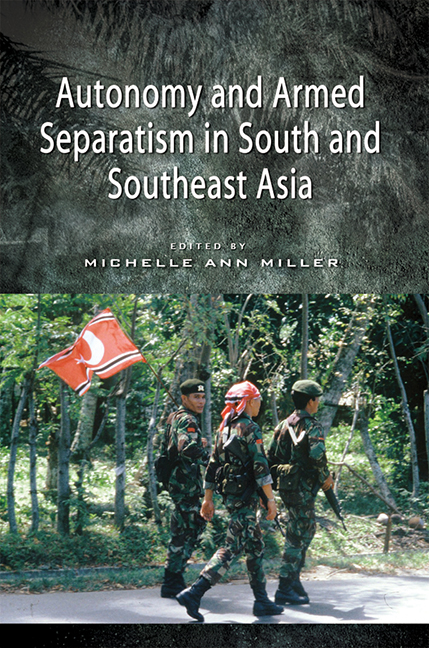Book contents
- Frontmatter
- Dedication
- Contents
- Acknowledgements
- About the Contributors
- 1 The Problem of Armed Separatism: Is Autonomy the Answer?
- 2 Mediated Constitutionality as a Solution to Separatism
- 3 Self-Governance as a Framework for Conflict Resolution in Aceh
- 4 Autonomy and Armed Separatism in Papua: Why the Cendrawasih Continues to Fear the Garuda
- 5 The Parallels and the Paradox of Timor-Leste and Western Sahara
- 6 Between Violence and Negotiation: Rethinking the Indonesian Occupation and the East Timorese Resistance
- 7 Struggle over Space in Myanmar: Expanding State Territoriality after the Kachin Ceasefire
- 8 Sri Lanka's Ethnic Conflict: The Autonomy-Separation Dialectic
- 9 Unitarianism, Separatism and Federalism: Competing Goals and Problems of Compromise in Sri Lanka
- 10 Autonomy and Armed Separatism in Jammu and Kashmir
- 11 Armed Conflicts and Movements for Autonomy in India's Northeast
- 12 Southern Thailand: The Trouble with Autonomy
- 13 The Last Holdout of an Integrated State: A Century of Resistance to State Penetration in Southern Thailand
- 14 Interlocking Autonomy: Manila and Muslim Mindanao
- 15 History, Demography and Factionalism: Obstacles to Conflict Resolution through Autonomy in the Southern Philippines
- 16 Conclusion
- Index
9 - Unitarianism, Separatism and Federalism: Competing Goals and Problems of Compromise in Sri Lanka
Published online by Cambridge University Press: 21 October 2015
- Frontmatter
- Dedication
- Contents
- Acknowledgements
- About the Contributors
- 1 The Problem of Armed Separatism: Is Autonomy the Answer?
- 2 Mediated Constitutionality as a Solution to Separatism
- 3 Self-Governance as a Framework for Conflict Resolution in Aceh
- 4 Autonomy and Armed Separatism in Papua: Why the Cendrawasih Continues to Fear the Garuda
- 5 The Parallels and the Paradox of Timor-Leste and Western Sahara
- 6 Between Violence and Negotiation: Rethinking the Indonesian Occupation and the East Timorese Resistance
- 7 Struggle over Space in Myanmar: Expanding State Territoriality after the Kachin Ceasefire
- 8 Sri Lanka's Ethnic Conflict: The Autonomy-Separation Dialectic
- 9 Unitarianism, Separatism and Federalism: Competing Goals and Problems of Compromise in Sri Lanka
- 10 Autonomy and Armed Separatism in Jammu and Kashmir
- 11 Armed Conflicts and Movements for Autonomy in India's Northeast
- 12 Southern Thailand: The Trouble with Autonomy
- 13 The Last Holdout of an Integrated State: A Century of Resistance to State Penetration in Southern Thailand
- 14 Interlocking Autonomy: Manila and Muslim Mindanao
- 15 History, Demography and Factionalism: Obstacles to Conflict Resolution through Autonomy in the Southern Philippines
- 16 Conclusion
- Index
Summary
Negotiating peace in an armed separatist conflict centres on finding an autonomy solution under which ethnic contestants are granted wide-ranging powers to control their affairs within an ethnically defined region (Lapidoth 1996; Ghai 2000). For both the state and the separatists, such a solution denotes compromise on their extreme positions. Realizing the futility of using violence in pursuit of their ethnic goals they participate as stakeholders in autonomy talks — an indication of change in their perception, attitudes and goals. Yet the road to peace tends to be bumpy and tortuous. Difficulties arise not only in initiating a peace process but also making it a success. In reaching a peace accord, both contestants work towards overcoming their structural constraints so that their decision to compromise on their original goals is acceptable to their constituencies. Concluding an ethnic peace accord does not guarantee resolution of conflict. It is possible that a peace process breaks down even while a negotiated political settlement is implemented, leading to the resumption of violence aimed at achieving the original goals of the warring parties. This marks the beginning of a new cycle in the conflict process (Sahadevan 2006).
This latter phenomenon typified Sri Lanka's secessionist conflict involving the Sri Lankan Tamil minority and the Sinhalese dominated Sri Lankan state. It began in 1956 when Sinhalese Buddhist nationalism triumphed and consequently a sense of alienation among the minorities grew due to the electoral interest-driven chauvinistic policies of the Sri Lanka Freedom Party (SLFP)-led government of S.W.R.D. Bandaranaike. Since then, the dynamics have changed to make the conflict in Sri Lanka one of the most protracted in South Asia. Importantly, the history of peace-overtures is as old as the conflict. However, permanent peace remains elusive despite the military success in May 2009 of the government against the Liberation Tigers of Tamil Eelam (LTTE). The Sri Lankan civil war involved two protagonists who had shown great resoluteness in employing violence in pursuit of their goals and, at the same time, displayed stiff resistance to a negotiated solution. The protracted nature of the conflict has produced three distinct forces with strong competing ethnic interests; they are the unitarianists, the separatists and the federalists.
- Type
- Chapter
- Information
- Autonomy and Armed Separatism in South and Southeast Asia , pp. 162 - 176Publisher: ISEAS–Yusof Ishak InstitutePrint publication year: 2012



